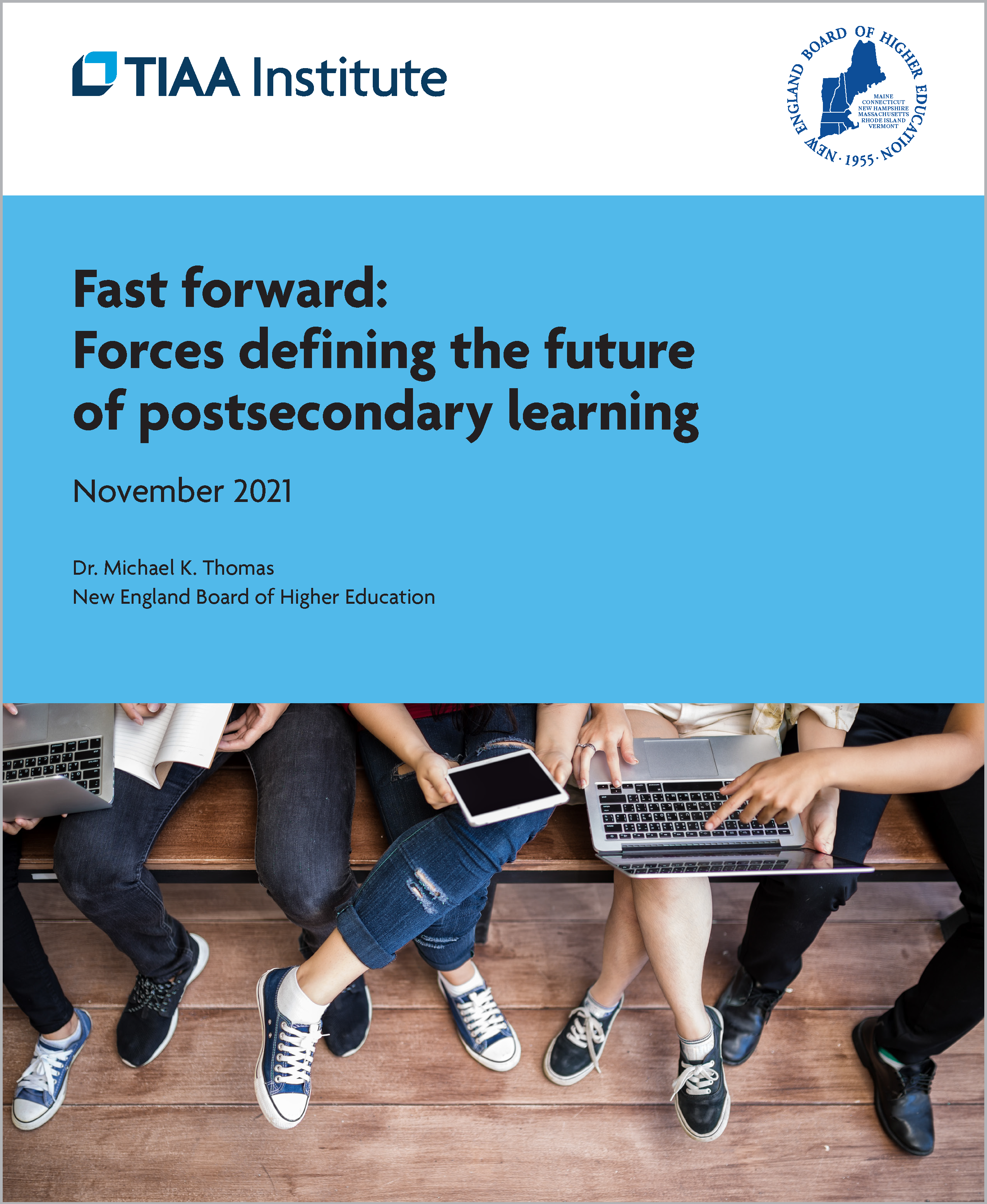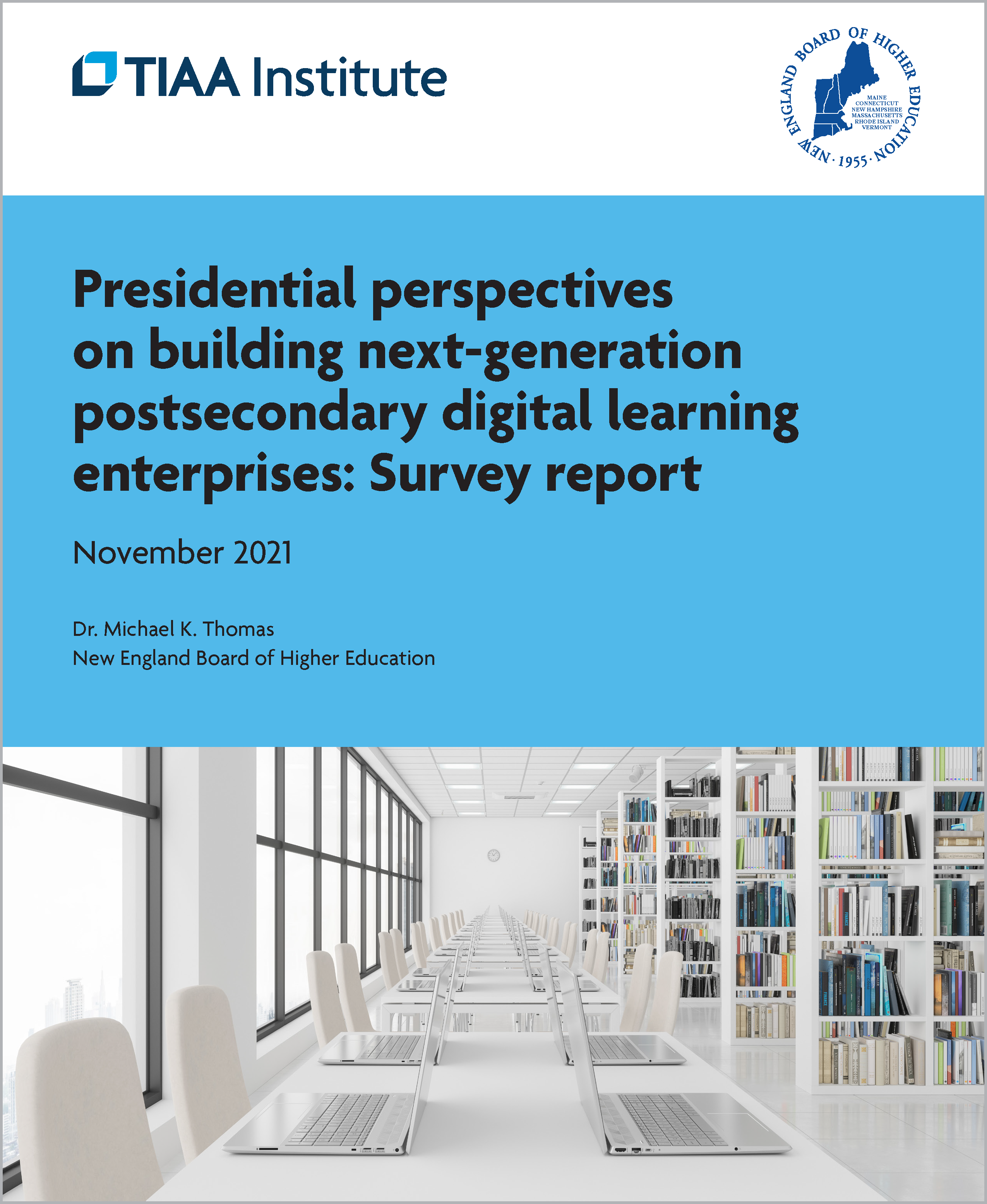Research Briefs
More than eight in 10 college presidents indicate their institutions intend to increase hybrid (both online and on-campus) learning and other support services as a result of the Covid-19 pandemic. Read the report here.
The Covid-19 pandemic spurred significant investments in digital transformation, accustomed people to remote collaboration and catalyzed growth in services to improve the learner experience. Read the report here.
Overview
The Next-Gen Digital Learning Infrastructure (NGDLI) project is undertaken by the New England Board of Higher Education (NEBHE) with the support of the TIAA Institute.
The project’s overall purpose is to build understanding of the digital future of the postsecondary learning enterprise and to strengthen strategic governance by institutional executives, governing boards and policy leaders.
Project Goals
Other goals of the NGDLI project include:
- Create a shared language and frameworks for understanding of NGDLI for higher education institutions (HEIs)
- Leverage recent events (including the global pandemic) to elevate the topic among senior HEI leaders nationally and motivate strategic action
- Gather expert perspectives on best-in-class examples, emerging technologies, key trends and opportunities—to inspire experimentation and innovation by HEIs
- Strengthen strategic HEI governance and the proactive pursuit of improved digital learning infrastructure
- Facilitate HEI collaborations and strategic alliances to support equitable and efficient development of NGLDI.
“Digital infrastructure” is defined as the digital tools used in varied teaching and learning models, both synchronous and asynchronous. The term also encompasses the key data systems and technologies employed across the learner lifecycle in recruiting, enrolling, supporting, advising, credentialing and work placement of learners who are on-campus, at a distance or a combination thereof.
Digital Transition or Transformation?
The pandemic forced HEIs to quickly rethink the delivery of nearly all aspects of learning, teaching and student support. But simply combining a learning management system (LMS) with videoconferencing revealed limitations and raised questions about quality and value. For example, research indicates that while students valued flexibility of program delivery during the pandemic, those accustomed to in-person education expressed concerns about a decline in quality with the transition to online.
While HEIs rapidly managed such digital transitions to resume instruction and other services, questions remain about the extent and permanence of digital transformations that occurred. This survey seeks to understand the extent to which the pandemic increased awareness among senior HEI leaders of the need to more proactively anticipate future changes and improve digital learning infrastructure.
Stakeholder Engagement
NGDLI will seek to directly engage:
- Senior higher education institution and system leaders, including:
- Presidents and chancellors
- Chief academic officers
- Chief financial officers
- Institution and system governing board members and leaders (trustees, regents, etc.)
- State higher education policy makers, including governors, legislators and state higher education executives/commissioners
- Business and industry leaders that employ HEI learners and graduates
- National higher education association leaders
- Executives of foundations supporting HEIs and learners nationally.
The project will create a dialogue among these leaders, driven by several key questions:
- What has COVID-19 changed for HEIs? What have leaders learned from pandemic-driven digital transitions?
- What does it mean for digital transformation and future learning infrastructure?
- How can NGDLI be defined? Why is it important? What best-in-class models or case studies can we learn from—inside and outside of higher education?
- What can HEIs learn from digital transformation in other sectors and organizations, particularly those that are knowledge- and service-intensive?
- In the near- and medium-term, how will technology and other forces enable the development of NGDLI?
- How might approaches to NGDLI differ by HEI size, mission and type? Given resource constraints (human, financial, technical, etc.), what role might multi-HEI alliances play in building and maintaining best-in-class DLI?
- What roles should HEI governing boards play in driving the strategic consideration of NGDLI? Of alliances and collaborations?
Events
The NGDLI Project will include a series of virtual events:
- The Changing Nature of Credentials: How to Compete in the Emerging Ecosystem (Week of June 6, 2022)
- Strategic Governance for Building Next-Gen Postsecondary Learning Enterprises (Week of June 20, 2022)
About the TIAA Institute
The TIAA Institute helps advance the ways individuals and institutions plan for financial security and organizational effectiveness. The Institute conducts in-depth research, provides access to a network of thought leaders, and enables those it serves to anticipate trends, plan future strategies, and maximize opportunities for success. To learn more about the Institute’s research and initiatives for higher education leaders, please visit its website.


